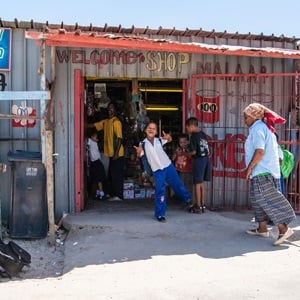
Johannesburg - We stand on the brink of a global technological revolution that will fundamentally alter the way we live, interact, work and do business.
Given the inexorable tension between small traders in historically black townships and retailers who “encroach on their turf”, on the one hand, and the impact disruptive technologies are expected to have on the retail business ecosystem, on the other, ill-timed interventions by competition authorities may have unintended consequences for small business competitiveness and consumer rights.
Let me explain.
Modern-day consumers are more connected, informed, discerning and empowered than ever before. As a result, their expectations and demands are rising rapidly and will only continue to accelerate at unprecedented rates in the future.
The ubiquity of technology in our daily lives is the primary enabler of this consumer change and has profoundly impacted the way products and services are consumed.
The South African retail industry, the subject of an ongoing grocery market inquiry by the Competition Commission, will undergo fundamental and drastic changes in the next decade as it strives to keep pace with today’s rapidly changing retail environment.
Despite continued growth in consumer spending, the future of traditional brick-and-mortar retail establishments, particularly those in black areas, is gradually coming under increasing pressure.
The vexing question is: How do “vulnerable” black traders and small independent retailers respond to the threats and opportunities presented by increased competition and the advent of the fourth industrial revolution?
It is important to note that, prior to 1994, traders who operated in black townships survived largely owing to limited choices for consumers in those markets.
This has all changed.
The foray by supermarket chains and foreigner-operated stores into black areas heralds benefits for consumers. It also presents both threats and opportunities for local black traders.
Whereas consumers stand to benefit through lower prices and better product choices and availability, this forces local traders and independent retailers to re-examine the way they do business.
Some local traders may, for instance, need to change their business and operating models to include integration into supply chain systems of national retailers if they are to endure. This option may, however, prove challenging given the pervasive self-absorption by national retailers.
The survival and future viability of most small businesses may require drastic transformation of their entire systems of production, distribution, management, governance and, importantly, customer engagement and fulfilment.
Competitiveness in the fast-moving consumer goods retail sector lies primarily in the economies of scale, business acumen and discipline. This has, however, been the Achilles heel for most black retailers who have, over the years, battled to out-compete foreigner-operated outlets.
On another front, it is unlikely that consolidation, expansion or diversification by national supermarkets would severely affect the majority of spaza shops as these operations are generally designed for convenient replenishment of small grocery items.
This may, however, affect the ability of small independent retailers in these areas to remain viable or expand their operations.
Also, anecdotal evidence suggests that most spaza shops are started as mechanisms by individuals striving for survival while seeking formal employment.
The success or otherwise of the commission’s inquiry lies in its ability to adopt a nuanced approach that seeks to balance its commitment to promote the development of small, medium and micro enterprises (SMMEs), on the one hand, and the demand for SMMEs to be responsive to the challenges presented by the changing environment, on the other hand.
The findings of this inquiry are expected to inform recommendations to be made to the minister of economic development.
Forebodingly, some pundits lament the role played by a megalomaniac minister whose apparent connivance with big business is seen as potentially weakening the commission’s institutional framework and erodes its efficacy in advancing transformation in the economy.
Perhaps the most jarring criticism of the minister lies in the assertion that he tacitly aided and abetted the Walmart-Massmart supplier development fund to subvert the objectives of the Competition Appeal Court’s order. But that’s a subject for another day.
Ironically, it was the selfsame Massmart that complained to the commission about the anti-competitiveness of exclusivity clauses in lease agreements entered into between property developers and its competitors. Massmart itself stands accused of not fully complying with the order that it, inter alia, integrate SMMEs from historically disadvantaged backgrounds into its supply chain value system.
The natural attrition or displacement of township traders by new entrants, while regrettable, is arguably a consequence of normal economic arbitrage and not necessarily due to exogenous anti-competitive forces.
It would, accordingly, be undesirable for the commission to protect inefficient small businesses unwilling to adapt to the changing retail ecosystem, nor take advantage of opportunities presented by the advent of the fourth industrial revolution.
Finally, it is imperative that South Africa’s big retailers and manufacturers, who have generally made ephemeral strides in the transformation of the sector, play a more proactive and meaningful role in shaping an inclusive economic future that works for all.
Otherwise, there has never been a time of greater opportunity or potential peril than that which South African SMMEs currently face.
Khaas is president of the SA SMME Forum, and past chairperson and current member of the Walmart-Massmart supplier development advisory board.
Follow him on Twitter @tebogokhaas
SUBSCRIBE FOR FREE UPDATE: Get Fin24's top morning business news and opinions in your inbox.
Read Fin24's top stories trending on Twitter: Fin24’s top stories




 Publications
Publications
 Partners
Partners











